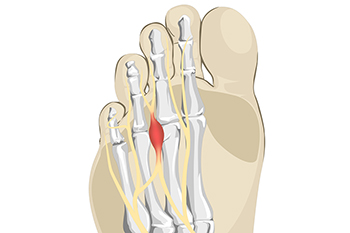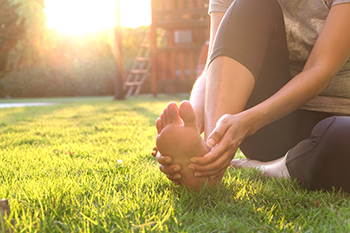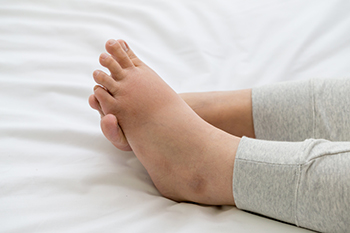

Morton’s neuroma is a painful and often underestimated condition that affects the ball of the foot, specifically targeting the web space between the third and fourth toes. More prevalent in middle-aged women, this condition can be debilitating, impacting one's daily activities. The discomfort of Morton’s neuroma may start as a subtle ache after walking, standing, or engaging in impact activities, but eventually it becomes more consistent and intense. Morton’s neuroma primarily targets the interdigital nerve, leading to swelling and thickening of the fibrous tissue surrounding the nerve. This compression can result in numbness or a pins and needles sensation in the forefoot. As it progresses, the pain may extend beyond the web space and radiate into the metatarsals. Patients often describe feeling as if there is a pebble or stone in their shoe. This unique sensation is a result of increased swelling and fibrotic thickening around the neuroma, causing an enlargement of the affected area. If you suspect you are experiencing symptoms of Morton's neuroma, it is suggested that you make an appointment with a podiatrist for a thorough evaluation and a personalized treatment plan.
Morton’s neuroma is a very uncomfortable condition to live with. If you think you have Morton’s neuroma, contact the podiatrists of The Foot & Ankle Center of New Jersey. Our doctors will attend to all of your foot care needs and answer any of your related questions.
Morton’s Neuroma
Morton's neuroma is a painful foot condition that commonly affects the areas between the second and third or third and fourth toe, although other areas of the foot are also susceptible. Morton’s neuroma is caused by an inflamed nerve in the foot that is being squeezed and aggravated by surrounding bones.
What Increases the Chances of Having Morton’s Neuroma?
Morton’s neuroma is a very treatable condition. Orthotics and shoe inserts can often be used to alleviate the pain on the forefront of the feet. In more severe cases, corticosteroids can also be prescribed. In order to figure out the best treatment for your neuroma, it’s recommended to seek the care of a podiatrist who can diagnose your condition and provide different treatment options.
If you have any questions, please feel free to contact our office located in Paramus, NJ . We offer the newest diagnostic and treatment technologies for all your foot care needs.

Heel spurs, bony outgrowths that form on the underside of the heel bone, can cause persistent heel pain and discomfort. While non-surgical treatments are often the first line of defense, heel spur surgery may become a consideration when conservative methods fail to provide relief. Heel spur surgery typically involves removing the spur or releasing the plantar fascia, the tissue that connects the heel bone to the toes. It is important to note that heel spurs themselves may not always be the sole source of pain. Often it is the associated inflammation and damage to the surrounding tissues that cause discomfort. Surgery is typically considered a last resort, reserved for cases where other treatments have proven ineffective. It is vital for individuals to have a thorough evaluation by a healthcare professional to determine the cause of their heel pain and whether surgery is the best course of action. If you have developed a heel spur, it is strongly suggested that you consult a podiatrist who can determine if surgery is a correct treatment option for you.
Foot surgery is sometimes necessary to treat a foot ailment. To learn more, contact the podiatrists of The Foot & Ankle Center of New Jersey. Our doctors will assist you with all of your foot and ankle needs.
When Is Surgery Necessary?
Foot and ankle surgery is generally reserved for cases in which less invasive, conservative procedures have failed to alleviate the problem. Some of the cases in which surgery may be necessary include:
What Types of Surgery Are There?
The type of surgery you receive will depend on the nature of the problem you have. Some of the possible surgeries include:
Benefits of Surgery
Although surgery is usually a last resort, it can provide more complete pain relief compared to non-surgical methods and may allow you to finally resume full activity.
Surgical techniques have also become increasingly sophisticated. Techniques like endoscopic surgery allow for smaller incisions and faster recovery times.
If you have any questions please feel free to contact our office located in Paramus, NJ . We offer the newest diagnostic and treatment technologies for all your foot and ankle needs.

Ollier’s disease is a condition where a person develops non-cancerous cartilage growths, called enchondromas, inside their bones. It often affects the bones in the hands and feet, which can cause the bones to become deformed. This can make the hands and feet look abnormal and may lead to problems like shorter limbs, fingers, or toes. Even though these growths start as non-cancerous, there is a small risk they can become cancerous later. People with Ollier’s disease usually have a normal life span, and it does not affect their intelligence. The disease is often noticed in children around the age of 5 and the growths typically stop once they reach early adulthood. If you notice something amiss with your child’s feet, it is strongly suggested that you make an appointment with a podiatrist for a proper diagnosis and treatment.
Some foot conditions may require additional professional care. If you have any concerns, contact the podiatrists of The Foot & Ankle Center of New Jersey. Our doctors can provide the care you need to keep you pain-free and on your feet.
Rare Foot Conditions
The majority of foot conditions are common and can be treated by a podiatrist. Standard diagnostic procedures are generally used to identify specific conditions and treatment can be rendered. A podiatrist also treats rare foot conditions which can be difficult to diagnose and may need extra attention and care.
There are many rare foot conditions that can affect children. Some of these can include:
Freiberg’s disease - This can be seen as a deterioration and flattening of a metatarsal bone that exists in the ball of the foot. It typically affects pre-teen and teenage girls, but can affect anyone at any age. Symptoms that can accompany this can be swelling, stiffness, and the patient may limp.
Kohler’s disease - This often targets the bone in the arch of the foot and affects younger boys. It can lead to an interruption of the blood supply which ultimately can lead to bone deterioration. The patient may limp or experience tenderness, swelling, and redness.
Maffucci syndrome - This affects the long bones in a child’s foot leading to the development of abnormal bone lesions. They are benign growths and typically develop in early childhood and the bones may be susceptible to breaking.
A podiatrist can properly diagnose and treat all types of rare foot conditions. If your child is affected by any of these symptoms or conditions, please don’t hesitate to call our office so the correct treatment method can begin.
If you have any questions please feel free to contact our office located in Paramus, NJ . We offer the newest diagnostic tools and technology to treat your foot and ankle needs.

During pregnancy, a woman's body experiences significant biochemical and musculoskeletal changes. As the baby grows, this alters her posture, placing increased pressure on her feet. Customized orthotics, which are specialized medical devices, become invaluable during this time. They help alleviate foot strain, ensuring alignment and balance which positively affect the spine, knees, hips, and neck. As the body morphs, orthotics can play a role in pain mitigation and maintaining postural adjustments. Custom-made orthotics can be tailored for different pregnancy stages, such as arch support in the second trimester, balance support in the third, and post-birth stabilization. An added advantage is their flexibility to be used with various footwear, making them a convenient choice for expecting mothers. If you are pregnant, it is suggested that you make an appointment with a podiatrist to see if custom-made orthotics can help you.
If you are having discomfort in your feet and would like to try orthotics, contact the podiatrists from The Foot & Ankle Center of New Jersey. Our doctors can provide the care you need to keep you pain-free and on your feet.
What Are Orthotics?
Orthotics are inserts you can place into your shoes to help with a variety of foot problems such as flat feet or foot pain. Orthotics provide relief and comfort for minor foot and heel pain but can’t correct serious biomechanical problems in your feet.
Over-the-Counter Inserts
Orthotics come in a wide variety of over-the-counter inserts that are used to treat foot pain, heel pain, and minor problems. For example, arch supports can be inserted into your shoes to help correct overarched or flat feet, while gel insoles are often used because they provide comfort and relief from foot and heel pain by alleviating pressure.
Prescription Orthotics
If over-the-counter inserts don’t work for you or if you have a more severe foot concern, it is possible to have your podiatrist prescribe custom orthotics. These high-quality inserts are designed to treat problems such as abnormal motion, plantar fasciitis, and severe forms of heel pain. They can even be used to help patients suffering from diabetes by treating foot ulcers and painful calluses and are usually molded to your feet individually, which allows them to provide full support and comfort.
If you are experiencing minor to severe foot or heel pain, it’s recommended to speak with your podiatrist about the possibilities of using orthotics. A podiatrist can determine which type of orthotic is right for you and allow you to take the first steps towards being pain-free.
If you have any questions please contact our office located in Paramus, NJ . We offer the newest diagnostic and treatment technologies for all your foot and ankle needs.